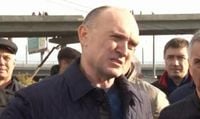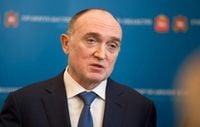In a significant turn of events, Boris Dubrovsky, the former governor of the Chelyabinsk region, is no longer considered bankrupt following a ruling from the Arbitration Court of the Chelyabinsk Region on April 22, 2025. The court's decision to terminate the bankruptcy proceedings marks a pivotal moment for Dubrovsky, who had been under financial scrutiny since July 2023.
The court's ruling came after businessman Denis Kashigin intervened to settle Dubrovsky's debts. Kashigin paid out nearly 9 million rubles, which included payments to AO Production Association Montazhnik, Dubrovsky's lawyer Kirill Mukhin, and the Interdistrict Inspectorate of the Federal Tax Service No. 32. Specifically, Kashigin reimbursed 7 million rubles to Montazhnik, 1 million rubles to Mukhin, and 702 thousand rubles to the tax service.
Initially, Dubrovsky had been liable for a staggering 37.3 million rubles in debts, but a series of legal adjustments ultimately reduced his financial obligations to 6.6 million rubles. This reduction was a result of a December 2024 court decision that revised the total owed to Montazhnik down from 9.7 million rubles.
Dubrovsky's journey through bankruptcy began with a claim filed by PO Montazhnik, which led to his bankruptcy declaration in July 2023. Following this, the court introduced a restructuring process for his debts. By January 2024, the court had moved to sell Dubrovsky's assets and appointed a financial manager to oversee the proceedings.
The register of creditors initially listed a claim from PO Montazhnik amounting to 34 million rubles based on a ruling from July 2022. However, as the case progressed, the court reduced this claim, reflecting the complexities and changes in Dubrovsky's financial situation.
In recent months, the legal landscape surrounding Dubrovsky has been tumultuous. In February 2025, the court reassessed the bankruptcy case, focusing on the creditor claims from Montazhnik, which ultimately led to the inclusion of the significantly reduced debt of 6.6 million rubles in the third queue of claims.
Interestingly, Dubrovsky's son, Alexander Dubrovsky, also faced bankruptcy issues and was declared bankrupt in November 2023. His own financial troubles involved claims amounting to 274 million rubles, illustrating a challenging financial period for the Dubrovsky family.
The court's recent decision to terminate the bankruptcy proceedings has been met with mixed reactions. Supporters of Dubrovsky view the ruling as a chance for him to rebuild his financial standing and reputation, while critics argue that it reflects a broader issue of accountability among political figures.
This case has drawn significant attention in the Chelyabinsk region, highlighting the intersection of politics and finance. As the former governor navigates this new chapter, it remains to be seen how he will manage his affairs moving forward.
In the wake of this decision, Dubrovsky's future endeavors, both in business and potential political engagements, will be closely watched. The resolution of his bankruptcy case could pave the way for new opportunities, or it might serve as a cautionary tale about the pitfalls of financial mismanagement.
As the Chelyabinsk region continues to grapple with economic challenges, the implications of Dubrovsky's financial recovery could resonate beyond his personal circumstances. Observers will be keen to see how this development influences public perception of former officials and their dealings.
In summary, Boris Dubrovsky's exit from bankruptcy is a notable development in the ongoing narrative of political and financial accountability in Russia. The court's ruling not only impacts Dubrovsky personally but also reflects broader societal issues regarding governance and financial ethics.





